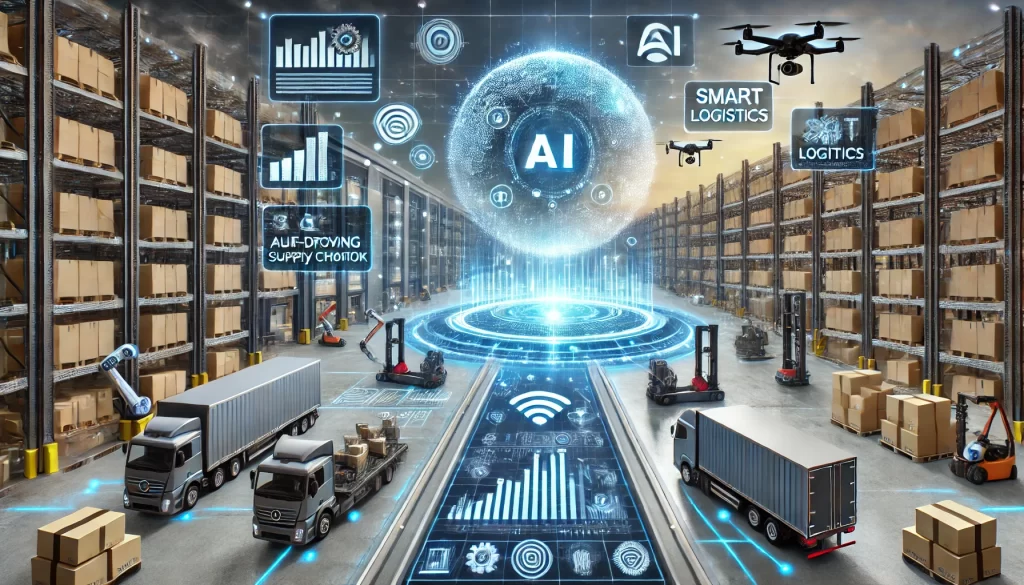The rapid advancements in Artificial Intelligence (AI) have transformed various industries, and supply chain management (SCM) is no exception. AI is revolutionizing logistics, optimizing operations, and enhancing decision-making processes. In this article, we will explore how AI is improving supply chain management, its benefits, key technologies, and future trends.
The Role of AI in Supply Chain Management
AI plays a crucial role in optimizing the supply chain by providing accurate demand forecasting, automating warehouse operations, improving logistics, and enhancing decision-making. Companies that leverage AI-powered solutions experience increased efficiency, cost savings, and better customer satisfaction.
1. Demand Forecasting and Inventory Management
One of the biggest challenges in supply chain management is predicting demand accurately. AI algorithms analyze historical data, market trends, and external factors to provide precise demand forecasts. This helps businesses:
- Reduce stockouts and overstock situations
- Optimize warehouse storage
- Improve customer satisfaction with better availability of products
Example: Companies like Amazon and Walmart use AI-driven predictive analytics to manage inventory efficiently, ensuring products are always available when needed.
2. AI-Powered Warehouse Automation
AI-powered robots and automated systems are transforming warehouse operations. These systems can:
- Optimize space utilization
- Reduce human errors in picking and packing
- Increase order fulfillment speed
Example: Amazon’s fulfillment centers use AI-driven robots to pick, pack, and ship products efficiently, reducing human workload and increasing efficiency.
3. Logistics Optimization with AI
Logistics is a critical component of supply chain management. AI helps optimize routes, reduce fuel consumption, and improve delivery times. AI-powered logistics solutions can:
- Predict traffic patterns and suggest the best routes
- Optimize vehicle loading to reduce transportation costs
- Minimize delivery delays
Example: Companies like UPS and FedEx use AI-powered route optimization software to ensure timely deliveries and reduce fuel costs.
4. AI in Supplier Relationship Management
Managing suppliers effectively is essential for a smooth supply chain. AI helps businesses analyze supplier performance, identify risks, and improve negotiations. AI-powered supplier management tools:
- Assess supplier reliability based on historical data
- Predict potential disruptions
- Optimize procurement processes
Example: Companies like IBM use AI-powered supply chain analytics to enhance supplier collaboration and reduce risks.
5. AI-Driven Risk Management in Supply Chain
AI helps businesses identify and mitigate potential supply chain risks. AI models analyze various risk factors, including geopolitical events, weather patterns, and economic conditions. Key benefits include:
- Early identification of supply chain disruptions
- Proactive risk mitigation strategies
- Enhanced decision-making in uncertain situations
Example: AI-powered risk management tools, such as those used by DHL, help predict disruptions and optimize contingency planning.
Key Technologies Driving AI in Supply Chain Management
Several AI technologies are reshaping supply chain management, including:
1. Machine Learning (ML)
Machine Learning enables predictive analytics, helping companies forecast demand, optimize inventory, and enhance operational efficiency.
2. Internet of Things (IoT) and AI
IoT devices collect real-time data on shipments, warehouse conditions, and fleet tracking. AI analyzes this data to improve supply chain visibility.
3. Natural Language Processing (NLP)
NLP-powered chatbots assist in customer service, supplier communication, and automated order processing.
4. Robotic Process Automation (RPA)
RPA automates repetitive tasks like order processing, invoice management, and warehouse operations.
5. Blockchain and AI Integration
Blockchain enhances transparency in supply chains, while AI analyzes blockchain data to detect fraud and inefficiencies.
Benefits of AI in Supply Chain Management
AI offers numerous benefits, including:
- Cost Reduction: Optimized operations reduce expenses.
- Increased Efficiency: Automation speeds up processes.
- Enhanced Accuracy: AI reduces human errors.
- Better Decision-Making: Data-driven insights improve strategic planning.
- Sustainability: AI helps in reducing carbon footprints by optimizing logistics.
Challenges in Implementing AI in Supply Chain
Despite its benefits, AI adoption in supply chain management comes with challenges:
- High Implementation Costs: AI integration requires significant investment.
- Data Privacy Concerns: Managing sensitive business data is crucial.
- Workforce Adaptation: Employees need training to work with AI-driven systems.
- Complexity of AI Algorithms: Implementing AI requires skilled professionals.
Future Trends in AI-Powered Supply Chain Management
The future of AI in supply chain management looks promising with several emerging trends:
1. Hyper-Automation
AI, RPA, and IoT will drive hyper-automation, reducing human intervention in supply chain processes.
2. AI-Powered Predictive Analytics
Advanced AI models will provide even more accurate demand forecasting and risk prediction.
3. Sustainable AI Solutions
AI will contribute to green supply chains by optimizing routes, reducing waste, and improving energy efficiency.
4. AI-Driven Autonomous Vehicles
Self-driving trucks and drones will revolutionize transportation and last-mile delivery.
Conclusion
AI is improving supply chain management by optimizing logistics, automating processes, and enhancing decision-making. Businesses that embrace AI-driven solutions gain a competitive advantage by reducing costs, improving efficiency, and ensuring sustainability. As AI technology continues to evolve, its role in supply chain management will become even more crucial.
For further insights, you can check McKinsey’s report on AI in supply chain management.
By leveraging AI, businesses can build resilient, agile, and efficient supply chains, ensuring long-term success in an ever-changing global market.


